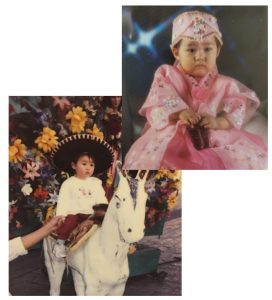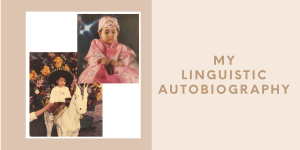When people ask me what is my first language, I always have a hard time answering. I was born and raised in Mexico City with a Mexican dad and a Korean mom. While being bi-racial, for me, meant that I naturally grew up bilingual, I would never consider Korean my first language, which most people find interesting. I speak Spanish as my first language, I would label Korean as my mother tongue, and English as my additional language. I remember someone asking me: “But, what language do you dream in?”, stating that whatever language we dream in is the language where we feel most comfortable. This is interesting to me because I don’t think I have ever paid attention to the language of my dreams. What if we dream in images? Or music? I believe dreams can be a language of their own. Language is complex but it is such an important part of our identity, which is why we want to label it as our first and second language, as our native language, as our mother tongue and so on. It makes sense because language is more than just a tool of communication, it is a way in which we choose to belong in certain communities, in which we can navigate through different societies and in which we make connections with other people. Thinking back and reflecting on my own language, culture and the educational journey has helped me realize what kind of future educator I wish to become.

Growing up in Mexico City you would think I was exposed to lots of diversity in one of the biggest and most diverse cities in the world. My truth is that I went to schools where I was the only “Asian-looking kid”, so I often felt like I needed to work harder to belong. I had always considered myself more Mexican because I was often trying to fit in with my peers, my teachers, and the culture we celebrated at school, but I look more like my Korean mom, which means my physical appearance has always been a barrier for me to fully belong with the Mexican kids. Growing up, I struggled to understand myself and where I would fit within my social groups. I was never Mexican enough for the Mexican kids and I was never Korean enough for the Korean kids. This identity crisis affected my relationship with my parents, my peers and my attitudes toward different languages.
Most of the socialization I was doing was with Mexican kids, which meant I was speaking Spanish every day except for when I was speaking with my mom. My mom really wanted her children to learn her language and culture, and she promoted an environment of learning for both my sister and me. We studied Korean at home, at Saturday Korean schools and we went to a Korean church. At Korean school, I was the only half Korean who was born and raised in Mexico. Most of my other peers had grown up in Korea and their first language was Korean, of course. This marked a clear difference in my Korean speaking, writing, reading and listening competencies which affected me more since I was constantly comparing myself to my other peers. I struggled every time I was asked to read out loud, or every time I failed my exams, often feeling ashamed of myself and feeling like I was less intelligent than those around me. My teachers felt lost and didn’t know how to support me and my mom was becoming more impatient with my lack of progress. This lack of confidence in my skills to learn Korean affected me completely. I had become very opposed to learning this language and all I wanted to do was stop going to Korean school and hang out with my Mexican friends on the weekends. Now, when I teach Spanish or tutor English, I always make sure that the students feel confident and comfortable making mistakes and learning and improving together. I know how much someone can struggle in their learning journeys when they are feeling ashamed and compared with other students and feel that they do not have the necessary skills to succeed.
English then became my additional language but now I am more comfortable speaking, writing, reading and communicating in English than in Korean. With English, I struggled too, because I was again the only one in the classroom at an International High School in Mexico where everyone else came from English-speaking countries. What was different? Purpose. I had a bigger goal and purpose with English than I did with Korean. I was surrounded by English-speaking students and all my classes were in English. English became a necessity, and a desirable trait for me to have in order to yet again, fit in with the peers I had around me. I think about how motivation and learning ability can be affected by the purpose and goals the students may have. Our own perspective on language and our own background and experience can shape how we perceive and gain knowledge of the language.
Language is part of my identity, and my culture, the way I perceive the world is different depending on the language I speak. I now wish I actually took Korean classes seriously because now I feel I am losing touch with my mother’s culture. Now I feel more like a stranger when I go to Korea to visit my grandparents. I know I cannot blame it all on my younger self because I have to be compassionate and empathetic with myself. I was struggling back then, to figure out who I was in this world and how I fit within the cultural norms imposed by our societies.
When I teach Spanish or tutor English, I think about the student’s purpose in learning this language. This sense of purpose and meaning for them will change their perspective on the language and therefore their approach to learning. I would like to become an educator who is able to help students make connections to the language they are learning and create meaningful purposes for their learning journeys. Maybe I can ask my future students what language they dream of and be curious about their backgrounds and experiences and perspectives on language.

I enjoyed this course because I was able to share and discuss different experiences and topics with my other peers. From these discussions, we learned that to be better educators we need to be aware of how students' own backgrounds and experiences might influence their learning journey.